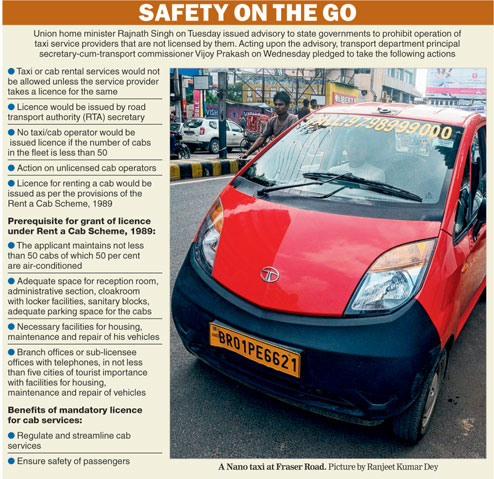
Radio taxi operators having less than 50 vehicles will not be allowed to run the show from now on.
The transport department has also decided to crack the whip with a separate licence rule for providing the service.
According to the rules of Rent a Cab Scheme, 1989, having a licence is a must for running the service. The rules, however, remained in files only till now and it took a directive from the Union home minister to all states and Union Territories to bring out the state transport department from its stupor so far as regulating the taxi services is concerned.
The home ministry had issued the directive after the recent Delhi rape in an app-based cab by its driver.
Interestingly, most of the existing cab operators in Patna appeared ignorant about the rules. 'We are not aware of the requirement of a separate licence required for running taxi services. We pay service tax, sales tax and labour tax among others. We have never been asked to get a licence. Besides, we are not fleet owners, as we own four vehicles and several other vehicle owners are associated with us,' said Prabhat Kumar, a taxi operator in the city.
In case of those having less number of cabs, the licence is not required. The transport department, however, has decided not to grant permission to run taxi services to those having less than 50 vehicles in their fleet. 'We need to regulate the sector else anyone would become an operator and it would become really tough to keep a tab on such operators,' transport department principal secretary Vijoy Prakash said.
Wing Commander (retired) Narendra Kumar, who is the honorary secretary of the Automobile Dealer Association of Bihar, claimed that the taxi services sector is largely unorganised. 'In order to run taxi service, one needs to take two types of licences - vehicle or driver's licence and fleet operator's licence or a licence for the business of running taxis. Though the taxi operators in the state take the commercial licence for individual vehicles but I do not think any of them take the licence for operating the fleet of taxis. There are many people, who register themselves as travel agencies and get a number of vehicles associated with them, and run the taxi service as travel agents,' said Narendra.
Narendra claimed that a major reason behind the operators not applying for licences is fewer number of vehicles in their fleet. 'There is hardly any taxi operator in Patna or elsewhere in the state, which have 50 vehicles or more in their fleet. Accordingly, they do not even qualify for applying for the licence. So, they simply run their taxis without taking the licence, which makes them illegal,' said Narendra.
The only central law governing taxi services was framed in 1989 and it deals with rent-a-cab scheme. By 2004, when radio taxis started operations in India, individual states framed radio taxi schemes but Bihar has not done this till now. Apparently, apart from Quick Cab, an agency running around 30 Tata Nano Cabs in Patna, there is no other radio taxi operators in the state.
GPS missing
Most modes of public transport in the city are unsafe. Tracking public transport with GPS, as recommended by the Centre after the December 16, 2012, Delhi gang rape still seems to be an alien concept in Patna.
Barring the newly arrived JNNURM buses and inter-district Gaurav Luxury buses, neither the yellow mini buses nor the 20,000 and odd autorickshaws or even school buses can be seen with these GPS devices, which help locate the vehicle. Few taxi operators in the city like Quick Cab have GPS devices installed.
Bus operators cited financial constraints as the major reason behind not installing the GPS devices. 'Each GPS device costs around Rs 10,000, which is a bit costly for the operators. The monthly subscription charges of Rs 250- 300 are still not that expensive. But the cost of the device and the issue of timely maintenance is a constraint for us,' said Sujit Pandey, proprietor, Pandey Travels Private Ltd.
Global Positioning System (GPS), a US-owned utility, allows the position of a vehicle fitted with a special chip to be indicated on a map. A constellation of satellites is used to provide the service. In January, the cabinet committee on economic affairs had approved Rs 1,405-crore project to track and monitor public transport and provide alarm buttons to alert the authorities.










